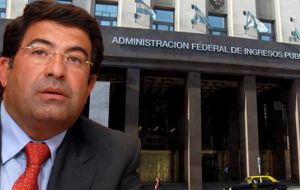MercoPress. South Atlantic News Agency
Argentina offers tax amnesty for undeclared dollars and assets in the country and overseas
 According to the tax bureau agency head Echegaray, Argentines have 160bn dollars in undeclared assets
According to the tax bureau agency head Echegaray, Argentines have 160bn dollars in undeclared assets The administration of President Cristina Fernandez announced the drafting of a bill intended to establish a recovery plan for undeclared assets within the country and abroad in order to strengthen the level of foreign reserves of the Central Bank. The government estimates Argentines hold 160bn dollars outside the financial system in the country and overseas.
The tax amnesty bill will provide savers with undeclared dollars within Argentina as well to those with offshore deposits in fiscal heavens the possibility to enter and/or re-enter them into the local market through the purchase of special bonds that will be issued in strategic sectors of the economy such as hydrocarbons or construction.
The initiative if successful should also take pressure from the local foreign exchange market which has seen the US dollar in the parallel market break the 10 Pesos barrier, equivalent to 45% increase since the beginning of the year.
As detailed by Economy Minister Hernán Lorenzino, at a joint conference with other members of the government’s economic team, the “new system for the development of investment in strategic sectors aims to attract more dollars to strengthen the Central Bank foreign reserves.”
”These two new financial instruments are the Argentine Bond for Saving and Economic Development, and the other investment option is a certificate for both the construction and real estate sectors as part of the reform of the Central Bank Charter“, the Minister stated.
”We target those with undeclared dollar savings so they can use them for investments“, Lorenzino explained.
Likewise, Lorenzino remarked that the idea “is to incorporate idle resources in the Argentine production model. These measures are integrated into the efforts that the most advanced countries are currently conducting to attract offshore funds to the formal market.”
Finally Minister Lorenzino said that the proposed issuance of these two bonds, one backed by YPF and the other with the approval of the Central Bank, will be sent to Congress on Wednesday.
On his turn, the head of the AFIP tax revenue office, Echegaray, explained that those willing to enter the assets recovery program will be exempted from taxes.
The announcement was made at the headquarters of the AFIP tax bureau agency, and included the presence of Economy Minister Hernán Lorenzino, Deputy Economy Minister Axel Kiciloff, Central Bank Governor Mercedes Marcó del Pont, AFIP Director Ricardo Echegaray, and Domestic Trade Secretary Guillermo Moreno.
By late 2011and the beginning of the second term of Cristina Fernández, Argentina’s Central Bank foreign currency reserves totalled 46.13 billion dollars; while, exactly one year ago, on 7 May 2012, the reserves were at 47.84bn dollars. Later and by August 2012, they experienced a sharp reduction of 1.7bn after meeting the payment of the Boden 2012 bonds to creditors, thus remaining at 45 billion dollars.
According to AFIP tax office there is an estimated 40bn dollars inside Argentina in the informal circuit and 120bn invested in overseas assets or deposited in tax havens.
AFIP Echegaray recalled that this is the second time that the government of Cristina Fernandez offers to launder undeclared assets. The first time in 2009, a total of four billion dollars surfaced, with 3.200 physical person presentations; 8.000 legal persons and 38.000 tax contributors who had the money in the mattress or in a bank coffer. At the time holders could keep the dollars after paying a levy between 3% and 5%.
This time dollar holders will receive dollar certificates, with an annual rate of 4%, but the currency will remain deposited at the Central bank as a guarantee of the documents. Laundered dollars can be invested in the Savings and economic development bonds, BADEN or in CEDIN, Investment Deposit Certificates.




Top Comments
Disclaimer & comment rules-

-

-

Read all commentsWho in their right mind is going to exchange their savings in return for worthless bonds?
May 08th, 2013 - 10:03 am 0I don't understand, 4% interest?
May 08th, 2013 - 10:08 am 0Now lets see hold the dollars and risk a tax bill,fine or necessary bribe,
May 08th, 2013 - 10:13 am 0or buy bonds AND LOSE THE LOT???
Commenting for this story is now closed.
If you have a Facebook account, become a fan and comment on our Facebook Page!